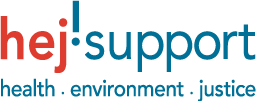
NGOs comment on EU paper on the future of SAICM
SAICMHEJSupport, EEB and a group of German NGOs (PAN Germany, BUND, WECF, Forum Umwelt und Entwicklung) developed suggestions for the EU member states discussion paper “EU and its Member States input to the draft Outcome document for a Global Strategic Approach for chemicals and waste Beyond 2020“.
Download of the paper: Joint Comment_NGOs_SAICM EU-MS Input_online
Some of the main points of the NGOs are:
On governance:
Sound policy and governance mechanisms are vital for a successful “future SAICM”. However, a vision how governance of a future SAICM can look like, is lacking in the input paper. One important element to include is the mandatory development of national action plans by each SAICM member, which should include SMART goals and should be funded for developing and transition countries. The governance structure should include the possibility to establish legally binding elements if necessary. These elements could be established faster and in a more flexible manner than the negotiation of new legally binding treating and conventions. The implementation should be fostered through strong report and evaluation mechanisms. If multi-stakeholder partnerships are established, strong guidelines for such partnerships must be implemented to avoid green washing and unequal distribution of power. Additionally, a mechanism is needed to further include issues of concern in the Targets/Milestones/Activity plan.
On financing SAICM Beyond 2020:
So far, there are no strategies to assure the financial cover of the process. The polluter-pays principle should hold those responsible for the damage who caused it in the first place (stronger industry involvement). The key to securing sustainable funding for chemical safety is the internalization of costs within relevant producer industries.The global chemical industry has an annual turn-over of approximately USD$4.1 trillion per year; a 0.1% levy would yield USD$4 billion annually for sound chemicals management.[1] Furthermore, a mainstreaming of sound chemical and waste management topics into the developmental sector could generate financial resources. In the financial distribution of those resources, support for developing and transition countries must be on the top of the agenda.
On safe alternatives:
The paper lacks a clear statement to give priority to safe substitution and safe non-chemical methods and alternatives. For many existing main challenges in the chemicals and waste management safer alternatives or safe non-chemical alternatives exist, like for lead in paint, asbestos, highly hazardous pesticides, mercury. A future SAICM should clearly support and promote those alternatives, including agroecology.
On linkages to other iniativies:
We welcome the attempt by Sweden to establish a High Ambition Alliance and strongly encourage the EU to attentively observe the coalition and presumably join as soon as the aims of the coalition are being announced. We also welcome the Global Pact for Environment and suggest that formal links between the Global Pact negotiating process and the Beyond 2020 Intersessional Process should be established so that SAICM stakeholders are fully informed about progress.
On waste:
We urge the EU to make sure that waste will not be eliminated from the post-2020 approach. The EU works towards a clean circular economy by developing measures for an effective chemicals and waste interface. Therefore, it is vital to think and work on chemicals and waste together, especially on international level, as they are highly intertwined, e.g. by the BRS synergy process. Separating the topics will create a lot of double work and contradict the synergy process, which was EU driven.
On core principles:
During SAICM’s negotiation there was strong support for naming additional chemical safety principles. These following principles should be explicitly highlighted in Beyond 2020: intergenerational equity,[2] precaution,[3] substitution,[4] polluter pays,[5] right to know,[6] good governance,[7] liability and compensation,[8] and full participation of women.[9]
[1] United Nations Environment Programme (2012) Global Chemicals Outlook
[2] Intergenerational equity: Take long-term impacts into account and sustain the Earth for future generations.
[3] Precaution: Decision-making tool in response to threats of serious or irreversible harm when full info not available.
[4] Substitution: If a chemical can cause harm it should be avoided if less dangerous products or processes exist.
[5] Polluter pays: Producing industries should internalize the true costs of their products.
[6] Right to know: Public access to information regarding harms to human health and the environment from chemicals.
[7] Good governance: Transparent, accountable, honest government operation is key to sustainable development.
[8] Liability: Responsibility and compensation for injury or harm.
[9] Rio Principle 20: “Women have a vital role in environmental management and development. Their full participation is therefore essential to achieve sustainable development.”



